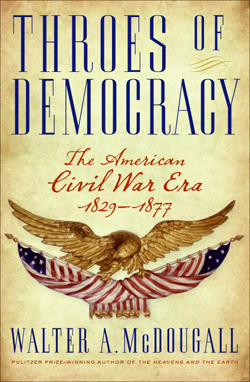Pretender Nation
Historian Walter McDougall examines the American Civil War era.

History professor Walter McDougall’s new book, Throes of Democracy: The American Civil War Era, 1829-1877, covers a half century of American history from Andrew Jackson’s presidency and the first rumblings of Southern secessionism through the “catastrophe” of the Civil War to the “failed” program of Reconstruction. McDougall calls Reconstruction America’s “first experiment in nation building.” The book is the sequel to Freedom Just Around the Corner: A New American History, 1585-1828, the second installment of his multi-volume series on American history from its colonial founding to the present.
McDougall is the Martin K. Alloy and Lawrence J. Ansin Professor of International Relations. He teaches U.S., European and Asia-Pacific diplomatic history and is the author of many books, including Promised Land, Crusader State: The American Encounter with the World Since 1776 and Let the Sea Make a Noise: A History of the North Pacific from Magellan to MacArthur. In 1986 he won the Pulitzer Prize for The Heavens and the Earth: A Political History of the Space Age.
McDougall uses Mark Twain’s notion of the writer’s mission to characterize the vocation of historian: “to tell truths about us.” More than a chronicle of facts, Throes of Democracy seeks “to expose … the lies Americans told themselves in order to get on with the business of realizing their personal and national destinies.” Lying, particularly the moral pretense leaders and citizens adopt to justify bloodletting and money-making, is at the heart of the American character, McDougall argues. “I believe Americans (on balance) are experts at self-deception. And I believe the ‘creative corruption’ born of their pretense goes far to explain their success.”
The author refers to the “fraud of manifest destiny” and observes that the civic religion of exceptionalism that Americans lived by excused and rationalized a host of sins in an age of expanding democracy, economic growth and outsized violence. The often-repeated narratives of American progress and the triumph of American ideals, he contends, ignored the existence of 19th-century slavery, brutal wars against indigenous peoples, extensive political corruption and unbridled capitalism. “Americans pretend lots of stuff,” McDougall says. “They pretend in order to get along with each other or to grease the skits of their institutions, obscure the contradictions in their politics and law, or just to sustain their common faith in truth, justice and the American way.”
The story of America’s triumph in the Civil War era mimics the mix of pretense and success hit upon by that great hustler P.T. Barnum – with all the vices of a conman as well as the virtues of a striver and builder. For good and for ill, McDougall concludes, “American history is a tale of human nature set free.”

